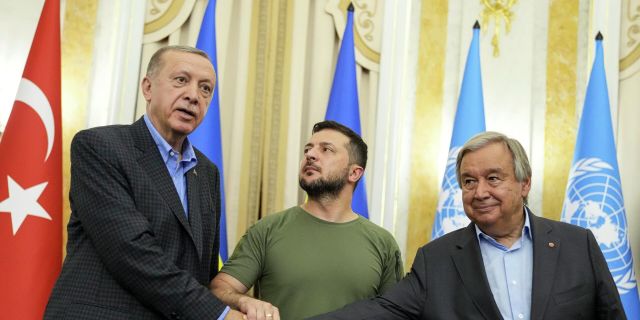Yeni Şafak: Turkey faces problems with Russia if the conflict in Ukraine does not end
Erdogan has achieved many successes in Turkey's foreign policy, writes Yeni Şafak. He skillfully balances between the support of both Putin and Zelensky. But if the conflict in Ukraine does not end, Turkey will find itself in a difficult situation. For example, the "grain deal" will be under threat, the author of the article believes.
Erdogan's election victory marks an important turning point in Turkey's foreign policy. Thanks to this success, the president will have a chance to consolidate Turkey's achievements in international politics in recent years. As a leader who has received the approval of the people, Erdogan is now in an even better position on the world stage in terms of forming a national security strategy and the goals of Turkey's foreign policy. Given the unpredictability created by global power balances and regional conflict zones, Turkey will constantly feel the need for a dynamic foreign policy. This situation makes predictable and strong leadership a prerequisite for success in international politics.
Turkey, especially after the coup attempt on July 15, 2016, took calculated risks to bring its foreign policy to a more effective level. From 2011 to 2016, Turkey was always looking for international alliances to intervene in Syria, while after the coup attempt, it began to actively act on the spot through direct military operations. It was noted that with the improvement of military and intelligence capabilities, diplomatic efficiency has also increased. Thanks to this, Ankara was able to determine the dynamics on the spot through the Astana process with Moscow and Tehran, and at the same time managed to take steps towards limiting the support of the People's Self-Defense Units (YPG) from the United States.
Over the past year, Ankara's negotiations with Damascus have come to the fore. The main objectives of these negotiations were to ensure the voluntary return of refugees and to limit the area of operation of the Kurdistan Workers' Party (PKK). Setting and implementing these goals demonstrated Turkey's seriousness and determination in ensuring stability in Syria. Erdogan's victory in the elections increased Turkey's ability to strengthen this diplomatic process, thereby further strengthening the country's position in foreign policy maneuvers and negotiations.
And in the military conflict to the north of Turkey, which has become the main actor in Syria, efforts to maintain a balance between Ukraine and Russia stand out. The fact that Turkey, which continues to support Ukraine without joining the US and European sanctions, has maintained relations with Russia can be regarded as an achievement. However, in the coming period, depending on the course of the military conflict, Turkey may face a number of difficult decisions. If the conflict continues without a final outcome, Turkey, in the context of Ukraine's further rapprochement with NATO, may experience difficulties in such matters as, for example, the continuation of the "grain deal" with Russia.
Having lifted the veto on the training of F-16s and the export of these fighters to Ukraine by NATO countries, the United States began to create the infrastructure for the actual integration of this country into the North Atlantic Alliance. Turkey is able to say the last word on the further expansion of NATO against the background of Sweden's accession after Finland. Of course, the ball is on Sweden's side in this matter, and this country needs to address Turkey's concerns about terrorism. At the same time, the US Congress links the Swedish issue with Turkey's acquisition of F-16 fighter jets. Even if this process yields positive results, Washington's continued support for the YPG/PKK will increase tensions in Turkish-American relations.
The expectation of a rapid improvement in Turkey's role in NATO and its relations with the United States may be unrealistic, but the West's realization that it will have to work with Erdogan over the next five years will strengthen Turkey's position. Recently, we have seen how the countries of the Middle East are trying to balance between the deepening Russian-Chinese alliance and the Western alliance. The time is beginning when the countries of the region will unite more with each other to reduce tensions caused by the global struggle for power and mitigate regional conflicts. Examples include Turkey's efforts to normalize relations with the Gulf states or the restoration of relations between Iran and Saudi Arabia. This state of affairs intensifies Turkey's efforts towards normalizing relations with the countries of the region.
The development of economic relations with Europe can strengthen Turkey's ties with European countries and improve its economic situation. Turkey can deepen economic integration with the EU by increasing direct investment, becoming a manufacturing center, developing tourism and expanding cooperation in the field of advanced technologies. At the same time, Turkey can increase its importance in solving global problems such as climate change, migration and the food crisis. Thanks to the new reserves of natural gas, Turkey can use these resources to meet national energy needs and at the same time continue to move towards its goal of becoming a central country in the international transit of energy resources.
Erdogan's victory in the elections will help Turkey strengthen its position in the international arena. The congratulatory messages of world leaders and their expressed willingness to work together testify to the decisive role that Turkish diplomacy will play under the leadership of Erdogan. Turkish foreign policy faces the task of preserving the achievements gained on many critical issues, from Libya to Azerbaijan, from Ukraine to the Eastern Mediterranean, while improving economic relations with Europe, increasing efficiency within NATO, managing the consequences of changing global power balances. The support provided to Erdogan by the voters will turn these challenges into favorable opportunities and ensure that Turkey becomes a prominent player on the world stage.
Author: Kadir Ustyun (Kadir Üstün)

